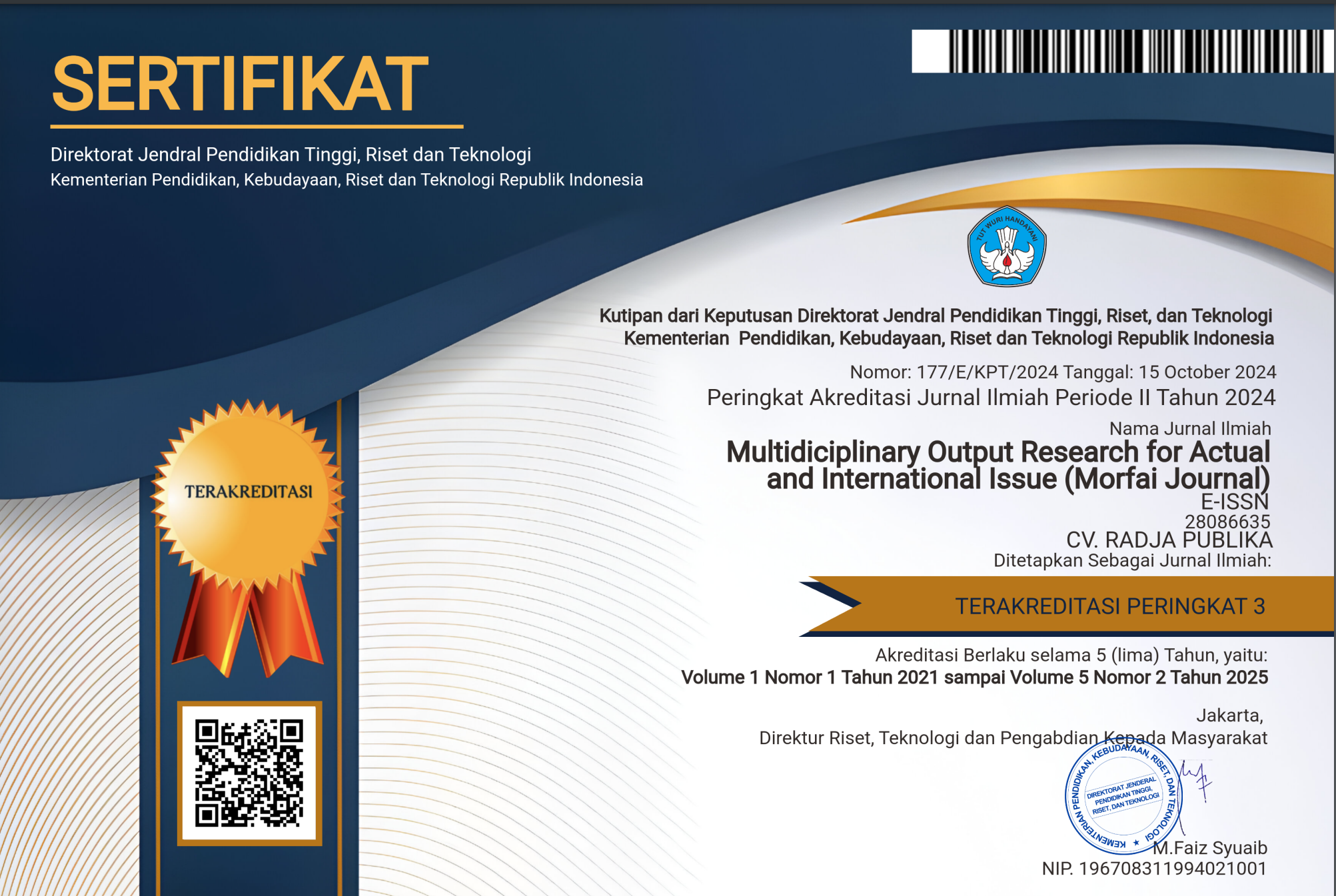THE INFLUENCE OF PRINCIPAL LEADERSHIP, TEACHER MOTIVATION, WORK CULTURE, WORK ENVIRONMENT, TEACHER WELFARE AND LOCAL COMMUNITY SUPPORT ON SCHOOL PERFORMANCE IN PRIVATE JUNIOR HIGH SCHOOLS IN BATAM CITY
Main Article Content
Mega Heriyanto
Sri Langgeng Ratnasari
Hermansah
This study aims to determine the effect of principal leadership, teacher motivation, work culture, work environment, teacher welfare, and local community support on school performance in private junior high schools in Batam City, both partially and simultaneously. The method used is quantitative analysis by distributing questionnaires to private junior high school teachers in Batam City. Statistical tests carried out include validation and reliability, as well as multiple linear regression analysis using the SPSS 21 program. Quantitative data were collected through questionnaires distributed to 120 respondents, consisting of principals and teachers, with a population of 200. Sampling was carried out using the product moment formula with an error rate of 5% with a non-probability sampling method, namely cluster sampling, with an error rate of 5%. The results of the analysis showed that all questionnaire items were valid (p <0.05) and the reliability reached 0.87. The results of multiple linear regression showed a calculated R value of 0.84, while the R table at α = 0.05 was 0.30. Thus, the hypothesis is accepted because the calculated R> R table. The R² value of 0.71 indicates that 71% of the variation in school performance can be explained by the six independent variables. The F test produces a significance value of 0.000, which confirms that the regression model is significant at the α = 0.05 level. The t test shows that all independent variables have a p value <0.05, indicating a significant effect both partially and simultaneously on school performance. This study is compared with three previous relevant studies, namely research by Sri Langgeng Ratna Sari (2020), which discusses the effect of leadership on motivation; Rahman (2021), which examines the impact of work culture on performance; and Putri (2022), which investigates the relationship between teacher welfare and school performance. These findings show consistency in the results related to the influence of managerial factors on educational performance.
Bakker, A. B., & Demerouti, E. (2017). Job demands–resources theory: Taking stock and looking forward. Journal of Occupational Health Psychology, 22(3), 273.
Bass, B. M., & Riggio, R. E. (2016). Transformational leadership. Psychology Press.
Cameron, K. S., & Quinn, R. E. (2011). Diagnosing and changing organizational culture: Based on the competing values framework. John Wiley & Sons.
Creswell, John. W. (2016). Research Design: Pendekatan Metode Kualitatif, Kuantitatif, dan Campuran. Edisi Keempat. Yogyakarta: Pustaka Belajar.
Deci, E. L., & Ryan, R. M. (2017). Self-determination theory: Basic psychological needs in motivation, development, and wellness. Guilford Publications.
Eyal, O., & Roth, G. (2011). Teachers' professional commitment: The role of school leadership. Educational Management Administration & Leadership, 39(5), 563-579.
Harris, A. (2014). Distributed leadership matters: Perspectives, realities, and possibilities. Corwin Press.
Hasim, M., Murni, S., & Sulasmi, S. (2020). The influence of teacher welfare on performance in schools. International Journal of Educational Management, 34(6), 1234-1245.
Hosan, H., Iskandar, I., & Rahman, R. (2019). The impact of school facilities on teacher performance. Journal of Educational Research and Practice, 9(2), 45-56.
Kemendiknas. (2010). Panduan keterlibatan masyarakat dalam pendidikan. Jakarta: Kementerian Pendidikan Nasional.
Komar, K., Masykur, M., & Sari, D. (2020). Organizational culture and teacher motivation: A study in Indonesian schools. International Journal of Educational Research, 102, 101-110.
Lukman, L., Rahman, R., & Sari, D. (2020). The effect of intrinsic motivation on teacher performance. Journal of Educational Psychology, 112(3), 456-467.
Manik, E., & Bustomi, K. (2011). Pengaruh Kepemimpinan Kepala Sekolah, Budaya Organisasi dan Motivasi Kerja Terhadap Kinerja Guru Pada SMP Negeri 3 Rancaekek. E-Jurnal STIE Pasundan Bandung, 1(1), 1-15. ISSN 2443-0633.
Marzuki, M., Sari, D., & Rahman, R. (2020). The role of teacher motivation in improving student learning outcomes. Journal of Education and Learning, 14(4), 345-356.
Masykur, M., Rahman, R., & Sari, D. (2019). The influence of organizational culture on teacher motivation. International Journal of Educational Management, 33(5), 123-135.
Parveen, R., Khan, M., & Ali, S. (2022). Community involvement in education: A key to school success. Journal of Community Engagement and Scholarship, 15(1), 78-89.
Pratiwi, A., & Negara, A. (2021). The impact of school leadership on teacher motivation and performance. Journal of Educational Administration, 59(2), 234-245.
Putra, A., & Sari, R. (2021). The impact of work environment on teacher performance in Indonesian schools. International Journal of Educational Research, 55(3), 145-158.
Putri, A. (2022). The relationship between teacher welfare and school performance: A quantitative study in Indonesia. Journal of Educational Research, 50(3), 200-215.
Rahman, F. (2021). Community support and its effect on school performance: A case study in Indonesia. Journal of Educational Management, 40(1), 50-65.
Rahman, F. (2021). The impact of work culture on educational performance: Evidence from Indonesian schools. International Journal of Educational Management, 45(5), 321-335.
Ratna Sari, S. L. (2020). The influence of leadership and teacher motivation on school performance in Indonesia. Journal of Educational Management, 39(2), 145-160.
Ryff, C. D. (2014). Psychological well-being revisited: Advances in the understanding and promotion of eudaimonic functioning. Psychotherapy and Psychosomatics, 83(1), 10.
Sugeng, S. (2019). Pengaruh Kepemimpinan Kepala Sekolah, Lingkungan Kerja, dan Motivasi Kerja Terhadap Kinerja Guru. Dalam Prosiding Seminar Nasional Program Pascasarjana Universitas PGRI Palembang. Universitas PGRI Palembang.
Sugiyono. (2019). Metode Penelitian Kuantitatif, Kualitatif, dan R&D. Bandung: Alfabeta.
Thapa, A., Cohen, J., Higgins-D'Alessandro, A., & Gower, A. L. (2015). What gets measured gets done: an examination of school climate measurement. Theory into Practice, 54(4), 359-368.
Wang, M. T., & Holcombe, R. (2019). The role of school leadership in improving student achievement: Evidence from the United States. Journal of Educational Psychology, 111(2), 245-258.
Wigfield, A., & Eccles, J. S. (2020). Expectancy–value theory of achievement motivation: A developmental perspective. Educational Psychologist, 55(3), 145-166.
Zhang, Y., Li, X., & Zheng, Y. (2020). Organizational culture and teacher performance in education: A meta-analysis. International Journal of Educational Management, 34(4), 511-525.









